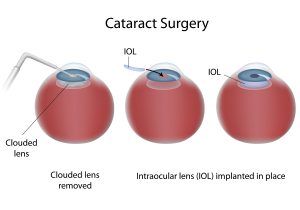5 Things Everyone Should Know About Cataracts
- Posted on: Dec 26 2019
 According to the World Health Organization, cataracts are the leading cause of blindness worldwide. But many people are in the dark when it comes to the causes of cataracts as well as how to treat them.
According to the World Health Organization, cataracts are the leading cause of blindness worldwide. But many people are in the dark when it comes to the causes of cataracts as well as how to treat them.
Whether you have been diagnosed with cataracts or are at risk of developing them, you should get the facts from an expert like Dr. Gregory Pamel. Read on as he shares five things everyone should know about cataracts.
1. Not all cataracts are due to age-related factors.
Although aging is a primary risk factor, cataracts can occur in children and young adults. Early-onset cataracts have been attributed to long-term sun exposure, genetics, long-term use of steroid medications, eye injuries and smoking.
2. At first, you might not know you have a cataract.
In the early stages of a cataract, you may not know there is a problem. Your vision may be slightly blurry or cloudy, but you may not think much of these symptoms and simply switch to a new pair of reading glasses. Gradually, cataracts will have a deleterious effect on the quality of your vision, and you may experience other symptoms like sensitivity to light or halos around lights.
3. Cataracts will not go away on their own.
Left untreated, cataracts will not resolve on their own. They will continue to get worse and cause visual acuity to deteriorate. In advanced cases, cataracts can cause legal or total blindness.
4. The only way to treat cataracts is with surgery.
Cataracts cannot be treated with eyedrops or medicine. The only way to treat a cataract is surgically. During the procedure, Dr. Pamel breaks up the lens into small pieces, removes the pieces from the eye and replaces the lens with an artificial lens implant.
Although every surgical procedure is a serious matter, cataract surgery is one of the safest and most commonly performed procedure. Ophthalmologists perform approximately 3 million cataract surgeries every year. It has a very high success rate, and complications are very rare, especially with a surgeon as experienced as Dr. Pamel. The recovery is usually short and patients can resume their daily activities in the days following surgery.
5. Cataract surgery may help you regain 20/20 vision.
Thanks to surgical and technological advances in recent years, it is very likely that cataract surgery will help you regain clearer vision than you have had in years. Studies have shown that 96 percent of eyes with no other medical problems achieved 20/40 uncorrected distance visual acuity or better. That is legally good enough to drive without corrective eyewear.
Contact Dr. Gregory Pamel
To learn more about cataracts and today’s cataract surgery advances, please call or email Dr. Pamel’s practice today.
Posted in: Cataract Surgery




